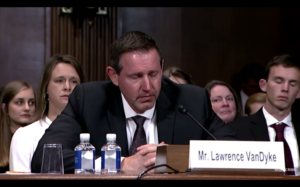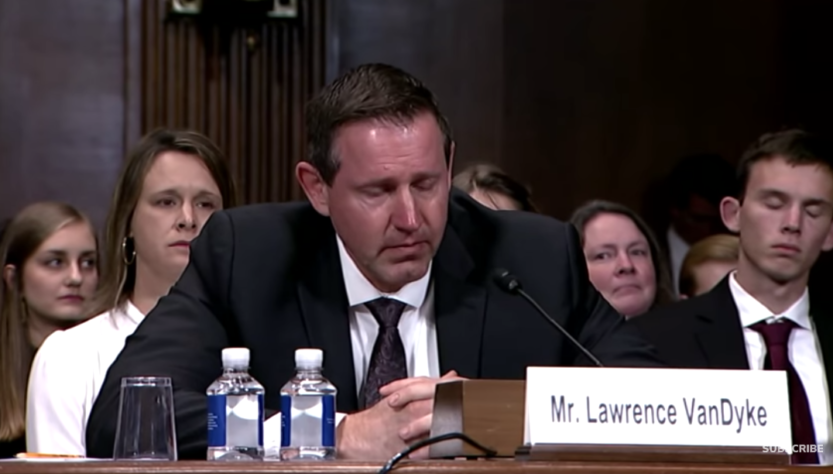 Lawrence VanDyke is unqualified to be a United States Circuit Judge. The ABA warned everyone about this, noting that VanDyke was “arrogant, lazy, an ideologue, and lacking in knowledge of the day-to-day practice including procedural rules.”
Lawrence VanDyke is unqualified to be a United States Circuit Judge. The ABA warned everyone about this, noting that VanDyke was “arrogant, lazy, an ideologue, and lacking in knowledge of the day-to-day practice including procedural rules.”
But Leonard Leo and Donald Trump rammed VanDyke onto the Ninth Circuit anyway and he’s used his tenure to confirm the ABA’s prescience.
He’s used his dissents to compare his colleagues to criminals or claim that they are “possessed.” The former included a lampshading footnote explaining that he preferred to not cite any caselaw, instead just insulting the rest of the court. That’s what sucks about including case citations… it gives the other side a chance to point out that they’re garbage.
Eventually Judge Andrew Hurwitz penned a pointed concurrence chastising the VanDyke’s unprofessional language as the province of “pundits and partisans” and inappropriate for a legal opinion.
But Judge Hurwitz still couched his own opinion in the spirit of collegiality.
VanDyke’s latest dissent from the denial of an en banc rehearing elicited another response from Judge Gabriel Sanchez. And this one drops some of the pleasantries from the Hurwitz concurrence and — joined by Judges Wardlaw, Clifton, Koh, Sung, H.A. Thomas, and Mendoza — reveals the growing frustration on the part of the adults in the room.
The dissent in this case, though, is particularly curious. In a case where—everyone agrees—we lack jurisdiction to rehear the merits of the appeals, one judge has taken it upon himself to write a 61-page advisory opinion. Only about 5 of those 61 pages purport to address the relevant question at hand—what exceptional circumstance, if any, renders en banc review appropriate? The rest details Judge VanDyke’s views of the Second Amendment and his disagreements with the three-judge panel decision. As we have long recognized, critiques of this nature are irrelevant because “[w]e do not take cases en banc merely because of disagreement with a panel’s decision, or rather a piece of a decision.”
As the concurrence notes, these “dissentals” as they’re called “often present a ‘distorted presentation of the issues in the case, creating the impression of rampant error in the original panel opinion although a majority— often a decisive majority—of the active members of the court . . . perceived no error.’”
Alas, this is a feature not a bug, these rambling dissents emanating from VanDyke’s corner and designed to stake his claim to MAGA Supreme Court papabile should Judge Ho lose his touch for disingenuous bullshit that exists merely as writing samples for Leonard Leo to ruminate over between calling the cops and causing wrongful arrest settlements. And so, apropos of nothing germane to the job of appellate judging, VanDyke delivered a 61-page advisory dissent.
U.S. v. Perez-Garcia is a gun case, specifically a case implicating the same reasoning of the Supreme Court’s recent Rahimi decision that laws barring dangerous people from having guns are entirely consistent with the Second Amendment. Despite this, VanDyke argued that the panel shouldn’t have written so much about disarming dangerous people as a “tradition” — though that is the law — and that the panel erred in citing legal conclusions that weren’t in the briefs — demonstrating the sort of “research” that VanDyke replaces with just calling everyone Satanists or something.
And so VanDyke — again, conceding that there is no justification to rehear the merits en banc — launches into his magnum doofus.
The observation I have made repeatedly in cases like this keeps being validated: our circuit is “more interested in sidestepping than following the [Supreme] Court’s Second Amendment precedent” by “latch[ing] onto phrases” and “conveniently overlooking such bothersome details like the government’s burden of supplying relevantly similar historical analogues.” Duarte, 108 F.4th at 788 (VanDyke, J., dissenting). Add this case to the top of the list. This latest effort stems from a particularly enticing opportunity for Second Amendment shenanigans, as the panel first rushed to issue a terse, unreasoned order affirming the district court. That order deliberately moot-proofed the panel’s ability to issue what was effectively, if not technically, an advisory opinion long after subsequent events overtook the defendants’ claims. More than a year later, the panel then made the most of the opportunity it had generated for itself, announcing as much new law as possible in a moot case where it was wholly unnecessary to do so, and then using mootness as a shield to argue against en banc review. Judge Reinhardt would be proud.
Yes, dragging one of the circuit’s deceased luminaries as “argument.” VanDyke is a deeply unserious jurist.
The rest of the 61-pages are equally eyerolling. He blathers at length about the idea that the appellate panel erred in adding its own analysis to the legal questions even though the restriction on adding outside issues is not and has never been a reason for courts to allow the law to be rewritten because one party didn’t do enough research.
Or as the concurrence puts it:
Where the opinion cited other historical sources, it was appropriate to do so. At the end of the day, whether a given regulation is consistent with the Second Amendment is a question of law. See United States v. Chovan, 735 F.3d 1127, 1131 (9th Cir. 2013), abrogated on other grounds by Bruen, 597 U.S. at 17; United States v. Oliver, 41 F.4th 1093, 1097 (9th Cir.), cert. denied, 143 S. Ct. 503 (2022); see also Does v. Wasden, 982 F.3d 784, 793 (9th Cir. 2020) (noting the “longstanding principle” that “when an issue or claim is properly before the court, the court is not limited to the particular legal theories advanced by the parties, but rather retains the independent power to identify and apply the proper construction of governing law”
VanDyke also offers his own personal reading of the Second Amendment, largely eschewing caselaw to offer his free-floating analysis reading more like a barstool explanation of Bruen after far too many. At one point he dismisses the idea that the court can craft exceptions to the Second Amendment based on “serious crimes” — sorta the whole point of Rahimi — writing, “That approach once again makes the Second Amendment a constitutional outlier.”
You know what actually makes it a constitutional outlier? The fact that — unlike the rest of the Bill of Rights — it comes with an explanatory clause about being contingent on allowing states to maintain militias free of federal interference. Seems like that would warrant a different approach than “shall make no law” but I digress.
Sadly, this is a problem that will impact the Ninth Circuit for some time. To borrow from the Karate Kid, “shame does not exist in the MAGA dojo” and pointing out VanDyke’s unprofessional, weak sauce work can’t dissuade anyone unwilling to hear it.
(Opinion on the next page…)
Earlier: Ninth Circuit Judge Has Had It With Trump Judge’s Insulting Dissents
Nominee Tries To Get Away With Mealy-Mouthed Gay Rights Statement And Then Cries About Getting Called Out On It
NEWSFLASH: Unqualified Federal Judges Are… Unqualified


